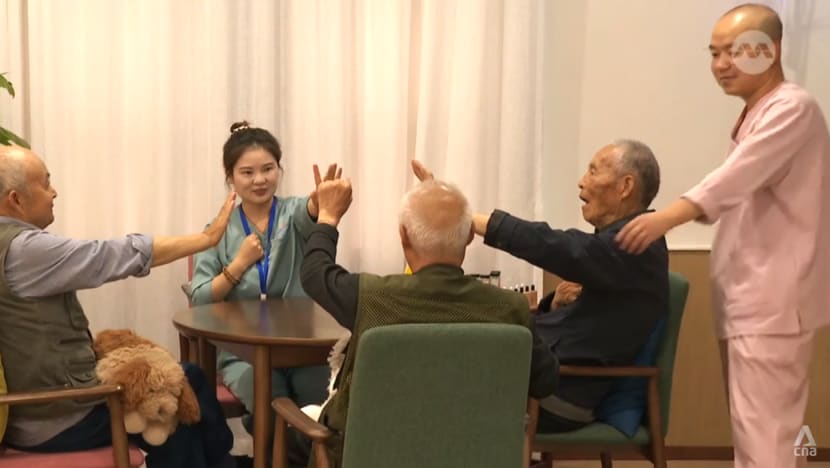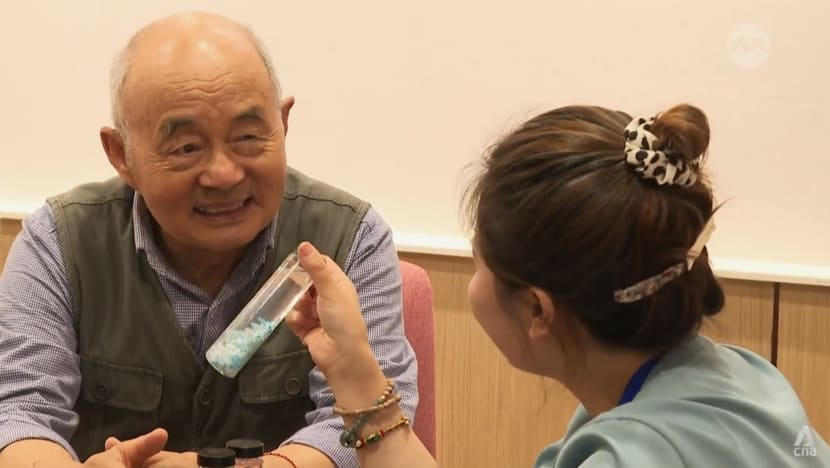In China’s first dementia village, residents live with dignity in a safe space
The 43,000 sq m facility – roughly the size of six football fields – features spaces that replicate familiar settings like a bus stop, an activity centre, a post office, a hair salon and shops.

Residents interact with staff at the Perennial Alzheimer’s Care Village Xi’an.

This audio is generated by an AI tool.
XI’AN: Nestled amidst lush greenery, tranquil lakes and the breathtaking Qinling Mountains in Xi’an, the capital of China’s Shaanxi province, lies a village designed to offer specialised care to patients with Alzheimer's and other forms of dementia.
It is China’s first dedicated Alzheimer’s care facility, built by Singapore real estate and healthcare firm Perennial Holdings.
The Perennial Alzheimer’s Care Village Xi’an is also the sixth such facility worldwide, with the first one set up in the Netherlands 20 years ago.
FAMILIAR ROUTINES PROVIDE COMFORT
The aim of these dementia villages is to blur the lines between home-like comfort and high-quality care, offering residents a dignified and fulfilling living environment, according to Perennial.
The 43,000 sq m facility – roughly the size of six football fields – features spaces that replicate familiar settings like a bus stop, an activity centre, a post office, a hair salon and shops.
This design allows residents to move about freely, while being monitored for their safety by cameras and facial recognition technology.
Trained staff role-play as post office workers or neighbours to offer a sense of community. A supermarket-like space is designed for residents to shop with play money, giving them a sense of independence.

One resident who has benefited from this environment is Madam Wang Lai Fei, who suffers from moderate Alzheimer’s disease.
The 76-year-old used to stay at home after her diagnosis. But her family struggled with her care, including incidents where she got lost.
Her daughter-in-law Lu Jing told CNA: “We had a nanny at home before, but she was unable to watch her all the time. We couldn’t manage either and she got lost twice.”
Looking for alternatives, Ms Lu and her husband decided to move Mdm Wang to the Perennial facility, which is conveniently located near their home.
The senior is now taking music lessons, going for acupuncture and quick strolls at the park - activities that seemed impossible just six months ago.
Despite costing more than the US$1,000 a month that Mdm Wang’s son Mr Lu would have paid to hire a nanny, the family thinks it is a good decision.
"Here, she eats and sleeps well, and her mental state is great. She's like a completely different, more energetic elderly lady. I think it's good,” said Ms Lu.
Fees range from about US$1,200 to US$1,800 per month, depending on room type and level of care required for each resident.
There are 700 beds across its eldercare complex, including at its nursing and rehabilitation hospitals.
Perennial said it hopes to attract more Alzheimer’s sufferers to live in the facility and aims to have about 100 residents by year-end.
In the meantime, it is renting out rooms to tourists and visitors at US$60 a night, saying that it allows for positive interaction with its patients as it keeps them in touch with the outside world.
"Our ramp-up and operations may take a little longer. There’s a process of market cultivation, and we also need to identify our target customers,” added Dr Song Xiang Ying, vice dean of Perennial Alzheimer’s Care Village Xi’an.
Although experts say the effectiveness of such open-concept care facilities requires further research, the approach is still a step in the right direction.
Dr Philip Yap, a senior consultant at Singapore’s Khoo Teck Puat Hospital, noted that patients may experience agitation, restlessness, and a poor quality of life in an institutional and more healthcare-like medical care facility.
"We want to then create spaces that would accommodate their routines and habits,” added Dr Yap, who is also chairman of social services agency Dementia Singapore.

DEMAND FOR MORE CARE FACILITIES
China has the world’s highest number of Alzheimer’s patients. Local media reported that nearly 17 million people suffer from dementia, including Alzheimer's disease - the most common type. Over 15 million of them are aged 60 and above.
Early this year, authorities rolled out a national action plan to tackle this issue by increasing dedicated care services.
By 2030, half of all eldercare facilities in China with more than 100 beds are expected to have dedicated dementia care units. Authorities also hope to train 15 million caregivers to work in the sector.
Dr Song noted that the care village received incentives from the local government.
“At present there are two options. If we build a new facility, it’s 10,000 yuan (US$1,400) per bed; for renovating an existing one, it’s 5,000 yuan per bed,” she said.
Dr Song added that the operating subsidy comes with certain conditions.
“We need to operate for a specified period and reach a certain occupancy rate in order to be eligible for it,” she said.

















